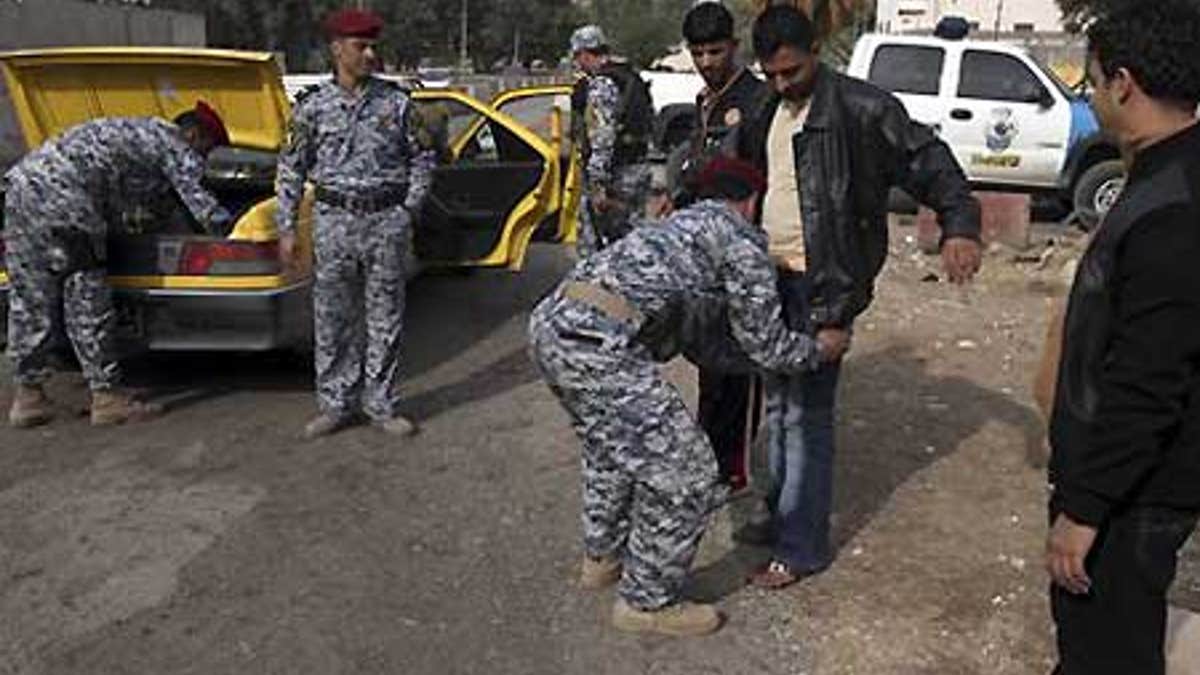
Dec. 14: Iraqi policemen search a man and his car at checkpoint in central Baghdad, Iraq. (AP)
BAGHDAD – The U.S. military confirmed Monday it had warned Iraqi officials about possible attacks in Baghdad the same day bombers struck government sites in the country's capital last week.
The U.S. military stopped short, though, of saying the intelligence provided to the Iraqis gave any insight into specific details of the attacks that killed 127 people. It was the third such large-scale strike in Baghdad since summer.
"While the information did address possible attacks that day, there was no specific actionable intelligence that correlated the threat ... to these attacks," Lt. Col. Mark Ballesteros said in a statement emailed to The Associated Press.
Ballesteros' statement confirmed what Iraq's top security chiefs have told lawmakers in hearings in parliament this week — that they were tipped off Tuesday by the U.S. military, hours before suicide bombers struck government sites.
According to Iraqi officials, the Baghdad operations command was called in the early morning hours and told of three potential car bomb attacks, including one near the Green Zone. But there wasn't enough time to act, the security chiefs told lawmakers.
The U.S. military routinely shares intelligence with Iraq's security commanders, Ballesteros said, adding that "information was shared on the morning of December 8th" in the same manner. He did not provide details.
The lawmakers, meanwhile, began a fourth day of hearings Monday with government officials over security breaches that allowed for the attacks to happen.
The session started behind closed doors, and the lawmakers were expected to make recommendations about security improvements and possibly increase funding for security, according to a statement on the parliament Web site.
During three previous days of hearings in parliament, Iraq's ministers of interior, defense and national security were grilled by angry lawmakers demanding answers as to how bombers eluded security in heavily protected downtown Baghdad.
Bombers used similar tactics in attacks against government sites in Baghdad on Aug. 19 and Oct. 25. More than 250 people were killed in those attacks.
Among the targets struck Tuesday was the main Iraqi appeals court, which sits next to the Green Zone. Guards opened fire on the suicide bomber, who plowed the vehicle through a checkpoint before detonating it and leveling the court.
Violence has dropped off dramatically in Iraq since 2007, though insurgents remain capable of pulling off large-scale attacks that routinely target security forces and civilians.
On Monday, gunmen robbed the Rasheed Bank in southern Kirkuk, 180 miles (290 kilometers) north of Baghdad, said Brig. Gen. Sarhat Qadir, a police spokesman. The robbers made off with millions of dollars worth of Iraqi Dinars, he added.
"The gunmen told the guards they had a suicide bomber with them. As a result, the guards fled the bank," Qadir said.




















